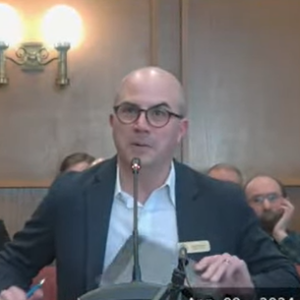A bipartisan proposal to protect free speech on Granite State college campuses faced some opposition from a crucial stakeholder during a Senate hearing Tuesday: administrators representing the University System of New Hampshire.
“I think our overall concern is that this bill appears to be a solution in search of a problem,” Chad Pimentel, the UNH system’s top attorney, told members of the Senate Education Committee.
Supporters like state Rep. Daniel Popovici-Muller (R-Windham), the legislation’s prime sponsor, argued the bill serves as a safeguard should future university administrations waver on protecting students’ constitutional rights.
The proposal states that “any member of the campus community who wishes to engage in non-commercial expressive activity on campus shall be permitted to do so freely, as long as the person’s conduct is not unlawful and does not materially and substantially disrupt the functioning of the public institution of higher education.”
Tyler Coward, lead counsel for the Foundation for Individual Rights and Expression (FIRE), testified in favor of the legislation, pointing out that the bill “does not change the legal obligations of the institutions in this state.
“It is just reiterating bedrock constitutional law,” Coward said. “Codifying those provisions so universities are full on-notice of what’s expected of them and students are on notice of what those rights are.”
Coward acknowledged that the UNH system is one of the most free-speech-friendly in the nation, ranked third in the country (out of 248 surveyed) in supporting its students’ right to free speech.
“The point is, sometimes administrations change, staff leaves, people retire, new folks come in, and things can change,” Coward said. “We’ve seen some really great institutions from six or nine years ago that were really fantastic on free expression take a turn backward.”
Pimentel later offered some pushback.
“As I look at the three-and-a-half pages of the bill, I do agree that you could boil it down to the single sentence: ‘The Constitution of the United States applies with full force to campuses of higher educational institutions,’” he said. “If that’s all it is, I struggle to understand what the other three-and-a-half pages are needed for or why the bill is needed at all.”
One major concern for UNH administrators, according to Pimentel, is language in the bill “defining campus community to include invited guests of members of the community.”
“As we read that, the concern is that a single student could invite a thousand people to get on the train from Boston to turn up in Durham, and we don’t believe those thousand people should be able to use our facilities in the same way that faculty, staff, and students ought to,” said Pimentel. “We’d ask that term be stricken.”
The “invited guests” language, according to the bill’s backers, is for speakers who are invited by college groups to speak but are later effectively shut down by ideological activists who disagree with their views. It’s a frequent occurrence on American college campuses, where progressives have successfully prevented speakers with center-right views from being heard.
In the current political climate, pro-Palestinian and antisemitic student activists are trying to keep pro-Israel speakers off campus as well.
“It’s been a real problem at institutions where student groups invite an outside speaker to visit campus, and the university either denies access to funds, denies a forum, or something like that, so that’s what the invited guests provision is meant to address,” Coward said.
Pimentel was later asked by state Sen. Donovan Fenton (D-Keene) whether university administrators would support the proposal “if we fixed all those issues you had with the bill.”
“It would be difficult to support a bill that may have unforeseen consequences when there doesn’t appear to be a current problem that needs to be solved,” Pimentel answered.
Popovici-Mueller countered that the bill passed the House on a 206-169 vote with “the most bipartisan support I have seen this session for a House bill that came out of the Education Committee.”
He also recalled earlier House hearings in which “literally nobody opposed this bill, other than the (UNH) administration” and noted that the American Civil Liberties Union of New Hampshire also supports the legislation.
Supporters repeatedly pointed to examples of educational institutions that once embraced the free exchange of ideas but abandoned that commitment over time.
“(University of California) Berkeley used to be the heart of the free speech movement, and today, it is common for violence to be used on the UC-Berkley campus to suppress the speech of speakers they find repugnant,” Popovici-Mueller said.
Additionally, Popovici-Mueller pointed out that other universities have adopted what is known as free speech zones, “which is essentially another way of saying ‘I’m going to take the free speech rights away from most of the campus except, you know, behind the Porta-Potty or in the forest.’”
“Again, the university representatives have clearly stated they do not intend to implement such policies, but what if the administration changes?” Popovici-Mueller continued. “Political pressure may apply, future administrations may be coming, and this bill would protect all members of the campus community.”
According to Pimentel, UNH Police Chief Paul Dean had planned on testifying on Tuesday as well but was unable to attend.




